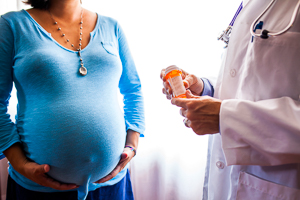Toxoplasmosis During Pregnancy
Topic Overview

What is toxoplasmosis?
Toxoplasmosis is a common infection found in birds, animals, and people.
For most people, it doesn’t cause serious health problems. But for a pregnant woman’s growing baby, it can cause brain damage and vision loss. Still, the chance of a pregnant woman getting the infection and passing it on to her baby is low.
If you’re pregnant or planning to have a baby and are worried that you may have toxoplasmosis, ask your doctor about getting tested. Routine testing is not recommended for most women.footnote 1 After you have had the infection, you’re usually immune and can’t get it again or pass it on to your baby.
But if you aren’t immune, you’ll want to take special care while you’re pregnant. Avoid anything that may be infected, such as infected meat and infected cat feces.
What causes toxoplasmosis?
A parasite causes toxoplasmosis.
You can get the infection by:
- Eating infected meat that hasn’t been fully cooked or frozen.
- Digging or gardening in sand or soil where an infected cat has left feces.
- Changing an infected cat’s litter box. Cats infected with the parasite pass it on to others through their feces.
- Eating anything that has touched infected cat feces, including fruits and vegetables that haven’t been washed. You can also get the infection by eating food that has touched tables and counters your cat has walked on.
What are the symptoms?
If you get toxoplasmosis, you may feel like you have the flu, or you may not feel sick at all. Most people who get the infection don’t even know that they have it. Symptoms may include:
- Swollen glands.
- Muscle aches.
- Fatigue.
- Fever.
- Sore throat.
- Skin rash.
How is toxoplasmosis diagnosed?
A blood test can tell whether you have or have ever had toxoplasmosis. If you’re worried about getting the infection, ask your doctor about having the test.
If you get the infection while you’re pregnant, you’ll need to have your baby tested. Your doctor can take some fluid from the sac that surrounds your baby and check for the infection.
How is it treated?
In healthy people, the infection often goes away on its own. But babies and people whose bodies can’t fight infection well will need to take medicine to treat the infection and prevent serious health problems.
If you get toxoplasmosis while you’re pregnant, you’ll take medicine that treats the infection. This medicine is called spiramycin, an antibiotic.footnote 2 Spiramycin collects in the placenta, the site through which the Toxoplasma gondii parasites travel to the fetus.
This medicine may:
- Keep your baby from getting the infection.
- Lower your baby’s chance of having serious health problems if he or she does get it.
Your baby has a better chance of being healthy at birth if you get treatment while you’re pregnant.
If an amniocentesis shows that a fetus is infected, a combination of antibiotics lowers the risk of birth defects and may cure the infection. Sulfadiazine plus pyrimethamine (an antibiotic commonly used for malaria) is sometimes used with the antibiotic spiramycin.footnote 2
Most newborns who have been infected with toxoplasmosis have no symptoms at birth. If your baby has the infection, he or she will need to take antibiotics for a year after birth. This lowers the chance of having problems later on.
How can you prevent toxoplasmosis during pregnancy?
There are several things you can do to avoid getting toxoplasmosis:
- Wash your hands and anything you use to prepare raw meat, chicken, fish, fruits, or vegetables.
- If you have a cat or are caring for one, ask someone to clean or empty the litter box while you’re pregnant. Wash tables and counters well if a cat may have walked on them. If you have to clean the cat’s litter box, wear gloves and a face mask. Be sure to wash your hands after you’re done.
- If you eat meat, make sure it has been fully cooked or frozen. Avoid dried meats, such as beef jerky.
- If you touch soil, be sure to wear gloves and wash your hands after you’re done. Avoid contact with cat feces in your garden.
- Wash fruits and vegetables before you eat them.
- Avoid untreated drinking water. This is a concern when you are in the wilderness or when you travel to a country where drinking water is not treated.
References
Citations
- American College of Obstetricians and Gynecologists (2000, reaffirmed 2011). Perinatal viral and parasitic infections. ACOG Practice Bulletin No. 20. Obstetrics and Gynecology, 96(3): 1–13.
- Montoya JG, et al. (2015). Toxoplasma gondii. In JE Bennett et al., eds., Mandell, Douglas, and Bennett’s Principles and Practice of Infectious Diseases, 8th ed., vol. 2, pp. 3122–3153. Philadelphia: Saunders.
Current as of: May 29, 2019
Author: Healthwise Staff
Medical Review:Sarah A. Marshall, MD – Family Medicine & Adam Husney, MD – Family Medicine & E. Gregory Thompson, MD – Internal Medicine & Kathleen Romito, MD – Family Medicine & Kirtly Jones, MD – Obstetrics and Gynecology, Reproductive Endocrinology
Topic Contents
This information does not replace the advice of a doctor. Healthwise, Incorporated, disclaims any warranty or liability for your use of this information. Your use of this information means that you agree to the Terms of Use. Learn how we develop our content.

